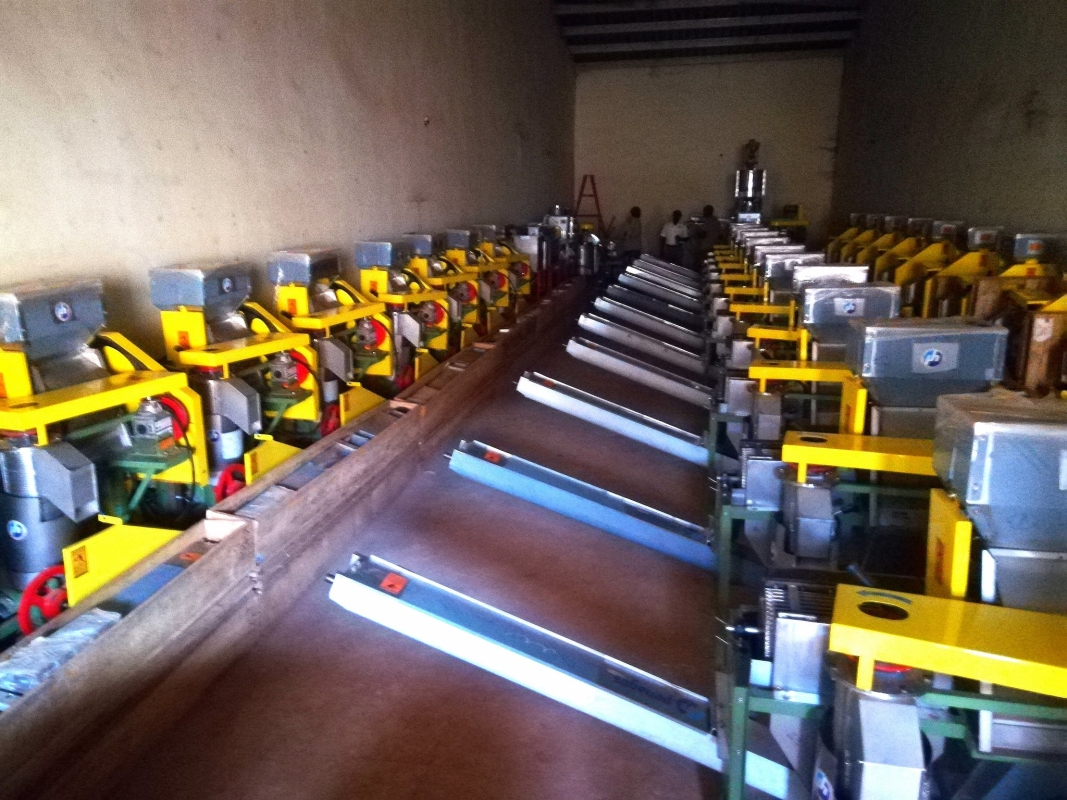
The Minister of State for Agriculture, Hon. Bwino Fred Kyakulaga launched the distribution of coffee wet processing equipment worth Shs 2.2bn to coffee processors from across the country yesterday. The launch took place at the Tirupati stores in Kyebando, Kampala.
The Ministry of Agriculture, Animal Industry, and Fisheries through the Uganda Coffee Development Authority (UCDA) gave out the Coffee Wet Processing Equipment (wet mills) to 35 Arabica-coffee farmers, cooperatives and institutions selected from different parts of the country.
The programme is part of UCDA's efforts to increase specialty coffee volumes and enable farmers and the country to earn premium prices from high-quality arabica coffee.
The Minister handed over five electric-powered wet processing units (UDC 2000) with a capacity to process 1,200 kgs of cherry per hour and 30 petrol-powered units with a processing capacity of 800kgs of cherry per hour. Once installed, the machines will pulp ripe coffee, separate the unripe and dry pods from the good parchment, and remove mucilage leaving high-quality parchment.
The equipment will serve farmers and groups in hard-to-reach areas of Kween, Lamwo, Bundibugyo, Ntoroko, Buhweju, Kanungu, and Kisoro that have all benefited from the program.
Officiating at the launch of the distribution of the wet mills to the selected beneficiaries in Kampala, Fred Bwino Kyakulaga, the State Minister for Agriculture, said that Uganda has 18 commercial wet mills only compared to dry mills which are over 850.
He noted the need to scale up wet processing to produce commercial volumes in Arabica and Robusta growing areas which will fetch farmers premium prices.
Bwino added that the main objective of procuring the 35 wet processing equipment is to increase the number of wet mills and enhance coffee farmers’ income through value addition by increasing the production of high-quality coffee.
Most of our coffee is processed and marketed as natural and misses the premium prices. Yet, if the coffee is processed as washed and specialty coffee, it earns more.
“For instance, one kg of natural Arabica (dry Uganda Arabica) coffee
fetches Shs14,000 while a kg of washed Arabica coffee fetches Shs18,000,” Bwino said.
“The wet mills will, therefore, increase the production of premium coffee which in turn will enhance the incomes of coffee farmers,” Bwino added.
Speaking at the same event, Dr. Emmanuel Iyamulemye, the Managing Director at UCDA, said that the Authority worked with Local Governments to select the beneficiaries.
"We went through a transparent and rigorous process to select the beneficiaries. Many farmer groups and cooperatives applied for the wet mills but since the funds available weren’t enough, the most qualified organisations were considered.
He added that the equipment will be installed and operational within two months. However, he cautioned the beneficiaries to use the wet mills for the intended objective.
“This is a conditional allocation from Government, and if the machines are not used properly, we shall take them back,” Iyamulemye said, urging beneficiaries to allow other farmers to use the equipment at no extra fee apart from operational costs.
Alfred Boyo, a director at Masha Coffee, who spoke on behalf of the beneficiaries, expressed gratitude to UCDA and MAAIF for availing wet mills to farmers, noting that they will handle them with care and make the best use of them.
He added that the Government should also consider investing more in secondary processing by making available relevant equipment like roasters and grinders.
SCOGEM Enterprises Ltd supplied the equipment. Walter Upoki Umika, the Managing Director at SCOGEM Enterprises Ltd, said all the machines are full coffee washing equipment and can do pulping, sorting, flotation, mucilage removal and have the flexibility to do honey coffee.
The smaller machines cost Shs40m each while the bigger ones cost about Shs220m each.
In FY 2020/21, Uganda earned US$ 559 million from 6.1 million 60-kilo bags. Placing substantial investment in the coffee sub-sector will be a game-changer for the country and the 1.8 million households who benefit from coffee.